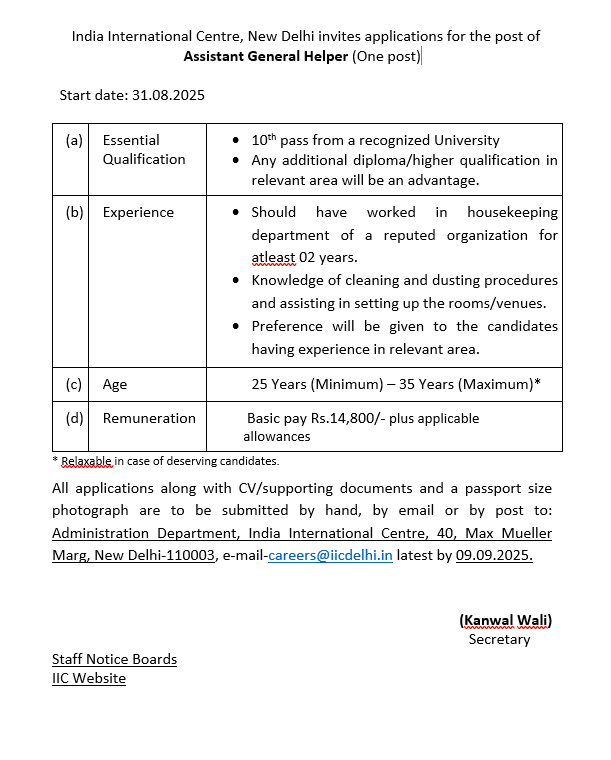Assistant General Helper (One post)


Duration: (68 minutes; English, Hindi, Marathi with Subtitles)
This unique film revisits the golden era of radio, before television, mobiles, and social media. It explores radio’s deep impact on passionate individuals, featuring a vintage radio museum in Bengaluru, the 1969 Apollo 11 Moon landing commentary, Ham Radio’s role in disasters like the Tsunami, and beloved programs like Binaca, Geetmala and cricket commentary. The film also highlights school radio keeping the tradition alive.
Awarded and screened at over 80 festivals in 36 countries, it’s recognized by UNESCO and featured on AIR.
Hindustani Classical Vocal
By Anuran Dasgupta (Vocal)
Tabla: Ujith Uday Kumar
Harmonium: Mausam
By Soumitra Thakur (Sitar)
Tabla: Ujith Uday Kumar
By Priya Purushothaman
Tabla: Pt. Shailendra Mishra
Harmonium: Mausam
(Collaboration: Shanti Agrawal Association of Music, Arts and Literature (SAAMAL)
Sounds of Mesopotamia: An Introduction to Kurdish Music
Illustrated talk by Hakan Çifçi
Kurdish music is a rich and diverse tradition deeply rooted in the culture and history of the Kurdish people of ancient Mesopotamia. Encompassing a variety of styles ranging from ancient folk traditions to more modern forms, it is characterised by unique melodies, scales and instruments. Themes of love and nature are common in Kurdish music, which plays a vital role in preserving Kurdish identity and culture. Traditional songs are often passed down through an oral tradition, with bards (called “Dengbêj”) playing a crucial role in transmitting stories, epic tales and lyrical poems. Join us to learn more about Kurdish music.
Hakan Çifçi represents Commission of Foreign Relations of Kurdistan National Congress – KNK
The Electoral Rolls Controversy and the Media
Panelists: S Y Quraishi, Former Chief Election Commissioner; Manisha Pande, Managing Editor, Newslaundry; Yogendra Yadav, Political Activist; Ashutosh, Co-Founder Satya Hindi; Gurdeep Singh Sappal, Leader, INC
Moderator: Pamela Philipose, Ombudsperson, The Wire
(Collaboration: The Media Foundation)
Pt. Narayanrao Vyas (1902–1984), a legendary Hindustani classical vocalist, left an enduring legacy through his music.
Chief Guest: Dr. Sandhya Purecha, Chairperson, Sangeet Natak Akademi, Delhi
Guest of Honour: Dr. Sachchidanand Joshi, Member Secretary, IGNCA, Delhi
Welcome Speech: Pt Vidyadhar Vyas, son and disciple of Pt. Narayanrao Vyas
Performances by Pt Vidyadhar Vyas accompanied Pt Shailendra Mishra on Tabla and Dr Vinay Mishra on Harmonium.
Performances by Dr. Vineet Goswami, Sh. Anand Oak, Dr. Richa Verma, Dr. Sanika Goregaonkar & Dr. Gatikrishna Nayak, discples of Pt. Vidyadhar Vyas
Prarthana: Composition by Maharshi Pandit Vishnu Digambar Paluskar
(Collaboration: The Vyas Academy of Indian Music)
Welcome Address and Introductory Remarks: Shri Prabhat Kumar, President, IC Centre for Governance.
Keynote Speaker: Shri Sunil Malhotra, Founder and CEO of Ideafarms. He is a breakthrough practitioner of Design Thinking, a serial entrepreneur, and a thought leader in Design Strategy.
Followed by interactive Q& A with the audience
Vote of Thanks: Brig Rajendra Kumar, Director, IC Centre for Governance.
(Collaboration: IC Centre for Governance)
A symposium on “Humanities Matter” which will focus on “Conceptualizing Humanities “. “Humanities and Sciences: An interface” and “Humanities as Bedrock of Knowledge “in 3 sessions.
The Symposium brings together diverse scholars and experts address questions that arise from the perceived threat to humanities across educational institutions. Technical and commercial advancement has marginalized humanistic values, empathy, and social justice. It will address the role of humanities for science, commerce, and engineering students, exploring how to balance theory with practice, resolve conflict constructively, and incorporate reflection into learning. The discussion aims to highlight the importance of humanities in developing well-rounded, thoughtful individuals and propose practical measures to integrate these values meaningfully into education.
Programme Committee: Sukrita Paul Kumar (Convenor), Prof Swati Pal, Principal, Janaki Devi College, Prof Asani Bhaduri, Cluster Innovation Centre, Delhi University
Ananda : An Exploration of Cannabis in India
By Karan Madhok (Aleph, 2024)
Discussants: Sh. Omair Ahmad, acclaimed novelist and journalist; Dr Khagesh Gautam, Professor, Jindal Global Law School, Ms Tripti Tandon, Lawyer and Drug Policy Analyst; Sh. Karan Madhok, author of the book
Moderator: Mr. Amritesh Mukherjee, Independent Journalist and Editor